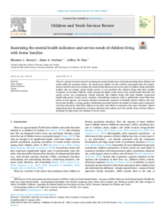Highlights
- Children living with foster families experienced significantly greater trauma (across domains; physical abuse, emotional abuse, sexual abuse, witnessing domestic violence).
- A strong, positive relationship was found between the number of trauma types experienced and foster placement, with foster children nearly seven times more likely to experience four types of trauma, compared to non-foster children.
- Children living with foster families also experienced significantly greater positive symptoms, risky or problematic sexual behaviour, difficulty with abstract thinking, as well as elopement, smoking, and lying behaviours.
- They also exhibited greater service urgency/complexity and resource intensity requirements.
- Parents of foster children were more likely to experience with addiction issues.
Abstract
There is a paucity of recent research examining the mental health needs of treatment-seeking foster children and youth within the Canadian context. The present data utilized 101,182 archived assessments from the comprehensive interRAI data set to examine the mental health indicators and service needs of children living with foster families who are seeking mental health services.
It was predicted that children living with foster families (compared to non-foster children) would demonstrate higher acuity levels across mental health indicators and greater service care requirements. Results indicated that children living with foster families experienced significantly greater trauma (across domains), externalizing symptoms, risky or problematic sexual behaviour, greater service urgency, and resource intensity requirements, compared to clinically referred children who were not in foster families.
A strong, positive relationship was found between the number of trauma types experienced and foster placement, with foster children seven times more likely to experience four types of trauma. Clinical implications stress the importance of trauma-informed interventions, given the specific needs of foster children, including the high acuity and intensity of service needs.

